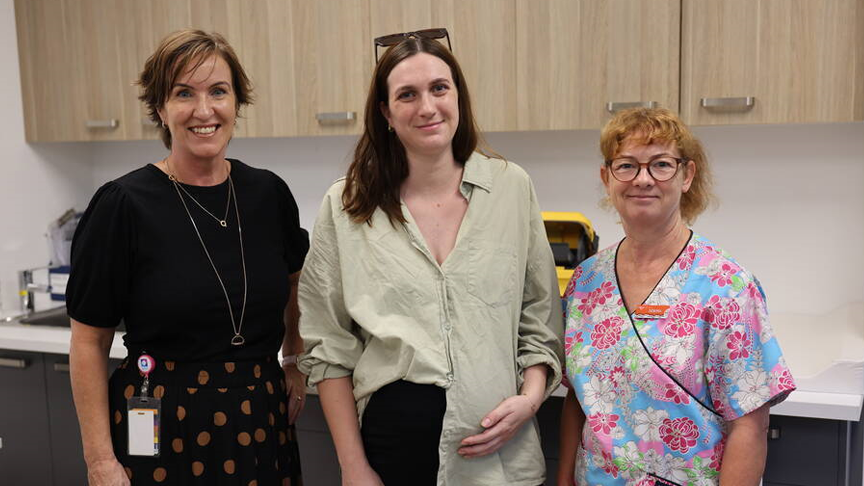
Pregnant women now have access to a free RSV vaccine that will help protect their baby during its most vulnerable months.
The RSV vaccine, Abrysvo, was added to the National Immunisation Program Schedule earlier this month, and the Sunshine Coast Health Public Health Unit is working with midwives and mothers to help educate them on the efficacy of the vaccine and importance of getting it.
Public Health Nurse and Midwife Donna Barnekow said it is recommended pregnant women receive the vaccine between 28 to 36 weeks gestation.
“Pregnancy vaccinations are not a new thing we’ve been doing that for many years with the diphtheria, tetanus and whooping cough vaccine and the influenza vaccine, so the way that works is the mother receives the vaccine, that makes her generate an immune response and creates antibodies to the disease - so in this case RSV with the Abrysvo vaccine - and then her body which is amazing at protecting her baby transfers those antibodies to the baby so when it’s born it has protection from day one,” she said.
Respiratory syncytial virus (RSV) is a common, highly infectious illness, that can cause chest infections and breathing issues for babies, especially for those under 6 months of age.
Studies have shown Abrysvo reduces the risk of severe RSV illness in babies during the first 6 months of life by 70%.
“These are inactivated vaccines they are not live vaccines, and they are shown to be very safe for developing babies,” Donna said.
“The most common side effects for the mother we might see are a sore injection site, some tiredness or a headache.”
In April last year the free RSV immunisation for newborns was rolled out across Queensland.
“When the baby RSV immunisation rollout occurred, our initial investigations told us the uptake was around 40% and then over time and with this education piece we’ve been creating with our midwives it’s now well over 70% month on month,” Donna said.
“What else it’s done is drastically reduced our hospitalisations for babies under the age of one – traditionally RSV is the number one reason why babies are admitted to hospital so to make that change has been wonderful.”
If a mother receives the Abrysvo vaccine, newborns are now not usually recommended to receive the immunisation unless they are born within two weeks of the mother receiving her vaccine, or if they have an increased risk.
“Vaccines in Australia are very, very stringently tested and trialled, we also have the benefit of looking at real world data from overseas when they often roll out vaccines before us, but to be put on the national immunisation schedule it’s certainly been tried and tested – our vaccines are always shown to be safe for mothers and for babies,” Donna said.
Due to demand, Sunshine Coast Health’s five Child Health Clinics now offer both childhood and pregnancy vaccinations.
Kirsty Cranswick received her RSV vaccination at 34 weeks gestation.
“I have an autoimmune disease that affects my health and having a toddler that brings home viruses I just want to make sure this baby’s protected against all sorts of respiratory illnesses that go around since I experienced that the first time around,” she said.
Kirsty’s toddler has previously been in and out of hospital with respiratory illnesses.
“It’s not pleasant watching them be uncomfortable, not being able to breathe properly, obviously them being monitored around the clock, being in an unfamiliar environment, it’s not pleasant to watch,” she said.
With the vaccine now available to pregnant women, Kirsty said she would much rather have it herself, than her newborn.
“If I can keep my baby healthy – that’s what I am going to do.”